I am often approached at LGBT events especially at protests rallies by filmmakers and journalists who want to write a piece or make a  documentary on the ‘horrible’ situation of African Lesbians and gays (they hardly take cognizance of bisexuals and Trans).
documentary on the ‘horrible’ situation of African Lesbians and gays (they hardly take cognizance of bisexuals and Trans).
There is no doubt that African LGBTs who reside in countries where their sexual orientation is criminalised face a daunting task. Living a closeted life or choosing to face the consequences of being out and proud in a society where one’s sexual orientation is criminalised is frightening and dehumanising. I have been there, I am still there, and I know how horrible the threats can be. So yes, I understand why the filmmakers and writers are fascinated with telling this horror story.
However, a recurring theme makes me cringe every time I am approached by filmmakers or journalists demanding that I tell the horror stories or at least provide them some graphic pictures of violence suffered by African LGBTs. There is this fascination with the horror stories and abused bodies of African LGBTs that I am beginning to wonder if it is a voyage into morbid porn and/or just another way to portray Africans as victims.
When I inform these filmmakers and journalists that I do not have pictures of abused African LGBTS to share with them, they are immediately crestfallen. It is my opinion that most of them haunt African LGBT activists protest grounds not because they are interested in the fight for African LGBT Rights but because they see the plight of African LGBTs as a way of furthering their career in Journalism or film industry.
A heart-wrenching, graphic documentary on the abuses suffers by African LGBTs and why African LGBTS need white saviours could turn a newbie into an award winner. Show some gory images, interview some pathetic homophobic people in rural areas who want to behead gays, splash this across the screens as another evidence of how barbaric Africans are and you might just have yourself an award-winning documentary.
Recently, I attended an lgbt rights workshop that comprised mostly of white human rights lawyers, LGBT organisation Executives, diplomats and policy makers. One of the speakers representing an organisation that produce LGBT documentaries presented a short documentary on persecution of African LGBTs as part of her speech. I dreaded what I suspected would be another stereotyped portrayal of African LGBTs.
And as suspected, the film featured mostly young black African LGBTs talking about how horrible life is in homophobic African countries and how much they want to get out of the continent.
The demography of African LGBTs is usually the same across such documentaries. They are often young and barely out of school or in some 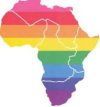 petty trade. With no established career yet, they are often portrayed as living with family with no other income hence the need to ask for donations to get them out of the country or at least get them away from family members who purportedly want to behead them because of their sexuality.
petty trade. With no established career yet, they are often portrayed as living with family with no other income hence the need to ask for donations to get them out of the country or at least get them away from family members who purportedly want to behead them because of their sexuality.
As I watched the documentary, I found myself sinking into my seat as yet another black African man in a rural village was interviewed. The barely literate man was asked what he would do if his son was gay. He spewed the usual rhetoric of how he would behead his own son if he found out he was gay.
After the documentary, the speaker spoke about how African LGBTs live such horrible lives and how the work of her organisation is important in bringing to light these atrocities. According to her, they show these documentaries to diplomats and policy makers from African countries as part of their advocacy. However, I have difficulty believing that such videos could sway the likes of President Museveni of Uganda, President Goodluck Jonathan of Nigeria or President Robert Mugabe of Zimbabwe. They probably would watch such clips and retort:
“As you can see from the documentary, our people won’t tolerate gays. Therefore, it is our duty as elected officials to respect the wish of our people. They want us to criminalise homosexuality and that is what we are doing”
Yes, this type of picture only goes further to create a justification for the despotic, homophobic African leaders in their united attempt to legalise homophobia, biphoia and transphobia in Africa.
As I said, there is no doubt that there are many homophobic, biphobic and transphobic Africans. I know what it is like to receive threats; I still
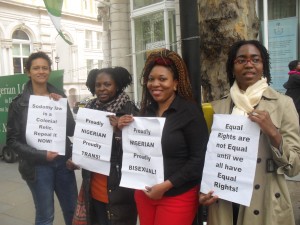 get hate mails every day. When I grant interviews on LGBT rights, the comments sessions burst with hate comments and threats.
get hate mails every day. When I grant interviews on LGBT rights, the comments sessions burst with hate comments and threats.
However, what I find disturbing is western filmmakers and journalists who are obsessed with telling a single story. Their storyline focus on portraying African lesbians and gays, as helpless, unemployed, abused, victimised people who want to, nay NEED to be saved. To them, saving African LGBTs means organising funds and donations to get African LGBTs out of Africa while assigning themselves the perk name ‘saviours’.
I am a staunch advocate of international solidarity and the need for the international community to speak out against the rising legalisation of homophobia in Africa.
However, what I see emerging in western media and LGBTs organisations are:
- Documentaries that portray African lgbts as victims in need of western saviours.
- Documentaries and writes ups that portray just one face of African LGBTs as young, unemployed and eager to leave the ‘unbearable’ continent.
- Obsession with single stories which portray African homophobes as illiterate village dwellers who want to behead all gays.
African LGBTs are portrayed as young, unemployed victims desperately seeking to get out of the continent. While African homophobes are portrayed as uneducated villagers who want to kill all gays, even if that gay is a family member.
This single story of the plight of African lesbians, gays, bisexuals and Transsexuals is misguided as well as exasperating, especially to those of us who know and live the bigger picture.
The reaction of the mostly white audience to the documentary ranged from pity, horror, disdain and a few tears depending on what part of the scene they were watching. The question and answer session provided an opportunity to share my observations with the audience and it more or less went thus:
I appreciate the efforts to bring to light the plight of African LGBTs. As someone who has and still suffer from the implications of criminalising 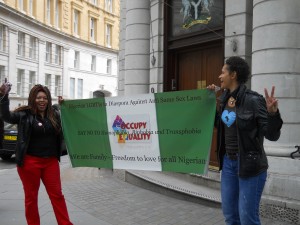 sexual orientation, I identify with the pains of my fellow African LGBTS. But that aside, I am not happy at the sensationalism of the plight of African LGBTs by filmmakers, writers, bloggers, journalists and LGBT organisations.
sexual orientation, I identify with the pains of my fellow African LGBTS. But that aside, I am not happy at the sensationalism of the plight of African LGBTs by filmmakers, writers, bloggers, journalists and LGBT organisations.
For example, this film, like many other documentaries about African LGBTs, portrays African LGBTs as victims and Africans as barbaric people who go around beheading gays. It is hard to find African LGBT Rights documentaries that do not feature a crude looking man who wants to behead gays.
I understand that going to the extreme to make a case could help draw attention to the issue. However, what I am seeing is a pattern that makes me very uncomfortable as an out and proud Bisexual African and LGBT rights advocate. It is becoming increasingly difficult to distinguish if this is just another way to portray Africans as uncivilised.
Whenever I am invited to LGBT workshops as a speaker, panel member or participant, I wonder if I am on display as the face of victims who need saving. Are African LGBTs activists living in diaspora now paraded as example of how we need to save African LGBTs?
As invited speakers, we are expected to regale the audience with horror stories of living in Africa. The audience expects to hear stories of how we were beaten, tortured and kicked out by our families. They want to hear about how we were persecuted and almost lynched before we escaped to Europe or America. When we don’t deliver the expected story, the disappointment in the room is almost always palpable.
There is no doubt some African LGBTs find themselves in these deplorable conditions, but this is not the only story of African LGBTS. This is not the only face of African LGBTS. African LGBTS are not mostly young people who are barely out of school, eager to be refugees.
- There are African LGBTS of all ages and sex living in Africa.
- There are African LGBTs living in Africa who have successful careers, own their own businesses, and are employers of labour.
- There are African LGBTS living in Africa who are not homeless, are self-sufficient and do not need their family to financially support them.
- There are African LGBTs living in Africa who do not wish to abandon their careers, leave their family and friends to seek asylum in western countries.
The above does not mean these African LGBTs do not suffer from the criminalisation of LGBTs and legalisation of homophobia in Africa. Not all violence is physical in nature. The fact that some of us do not have physical bruises from being out and proud LGBTs while we lived in
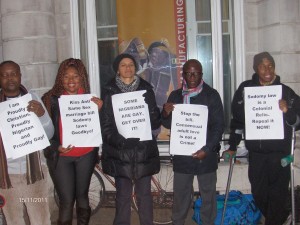 LGBTphobic countries does not mean we did not suffer and still do not suffer abuse and various forms of discrimination.
LGBTphobic countries does not mean we did not suffer and still do not suffer abuse and various forms of discrimination.
Psychological abuse, blackmails, threats of losing our comfortable jobs, threats of being outed to families, colleagues, employers or rival companies are issues African LGBTs face daily.
African LGBTs who are politically active face the threat of having their political career cut short and ostracised in political and social circles.
African LGBTs who are business owners face the threat of having their businesses boycotted which might lead to the loss of their livelihood.
Violence and abuse come in different shades. We need to highlight these varieties of shades and not just stick to a single shade because it sells papers, win awards, bring in the money, donations or appeal to ‘click activism’.
Another point to note is that not all African homophobes are illiterate rural dwellers. LGBTphobic Africans also live in cities, not just in the rural villages as often portrayed in these documentaries.
However, it is also important to note that there are Africans who are not homophobes, biphobes or transphobes. Indeed many African straight allies are willing to support LGBT rights in public. Western journalists and filmmakers should understand that:
- There are Africans who are sitting on the fence about LGBT rights
- There are Africans who do not want to behead gays.
- There are Africans who do not condone the lynching of gays or support jail term for LGBTs.
The problem is that the media, filmmakers, writers, LGBT organisations, and grant seekers attention is so focused on the ‘Helpless Victim vs Barbaric Homophobe‘ stereotype that they lose sight of the other demography. There are many facets on the plight of African LGBTs, why focus on a single story?
Recently, under the auspice of the campaign group, Nigerian LGBTs in Diaspora Against Anti Same-Sex Laws, i organised a protest outside a Nigerian award ceremony in London celebrating the 100 years of Nigeria’s amalgamation. We peacefully protested at the venue to advocate for the rights of LGBT Nigerians who face 14 years imprisonment for their sexual orientation. As part of our strategy, we stood outside (as shown in this video) and asked guests questions like:
“Do you support the 14 years imprisonment for lgbt Nigerians?”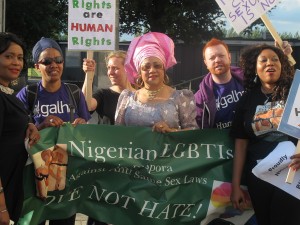
“Do you support equality for all including lgbt Nigerians?”
“Do you think the anti-lgbt law should be repealed?”
Interestingly, more than 85% of Nigerians we spoke to at the occasion condemned the antigay law. Some of the guests even posed for pictures with our LGBT banners and placards. The voices of those Nigerians need to be heard.
Unfortunately, western documentary filmmakers and journalists are not interested in the progressive voices of educated Africans who are allies of African LGBTs. Such progressive African stories do not sell papers, or make for an award-winning documentary on African lgbts.
Funders are not eager to fund non-sensationalised documentaries showing interviews of African LGBT straight allies speaking up for lgbt rights in Africa. This is not the narrative or face of Africa funders promote. This type of story out of Africa does not make headlines or bring in the donors!
All parts of the story needs to be told and those who have access to resources should endeavour to tell it all.
Some African LGBTs living in the diaspora today have had to abandon good careers to seek protection from persecution. Contrary to popular media portrayal, we were not all eager to claim asylum.
African LGBT immigrants are not automatically economically better off than we were before migrating to western countries. In fact, many of us are financially worse off. Getting a job in a foreign land is fraught with difficulties especially when prospective western employers look down on African university degrees.
Many African LGBT immigrants have learned the hard way that their African degrees and career experiences do not count for much in their new abode. To survive, they settle for menial jobs with little prospect.
African LGBTS refugees might have escaped homophobia when they left their countries; however, they now have to face racism and many are ill prepared for the ugly face of racism.
It is no news that even NGOs have racist glass ceiling on how far immigrants can climb the ladder, assuming they grant them space at all. Some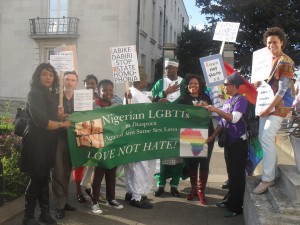 LGBT organisations invite a few African LGBT immigrants to workshops as a form of tokenism, and sometimes reserve a token seat for them to regale the audience with tales of their horrible experience in Africa. The sad part is, no matter how qualified these African Lgbt activists are, they hardly get the opportunity to earn their living as LGBT Organisation employees in their adopted countries.
LGBT organisations invite a few African LGBT immigrants to workshops as a form of tokenism, and sometimes reserve a token seat for them to regale the audience with tales of their horrible experience in Africa. The sad part is, no matter how qualified these African Lgbt activists are, they hardly get the opportunity to earn their living as LGBT Organisation employees in their adopted countries.
It is considered ok to parade them during workshops, but that is where the equality and solidarity ends. There are African LGBTs activists in diaspora who have good degrees and career experience in dealing with HIV/MSM issues, but they hardly get a foot in the door when they apply for relevant advertised vacancies.
Some western allies and organisations consider it an act of ‘salvation’ to help African LGBTs migrate, but what are the chances that they would help them be self-sufficient, independent or provide options of career opportunities within LGBT organisations when they arrive in these foreign lands? From personal experience and talking with fellow well qualified, now disillusioned, Africans LGBTs in diaspora activists, I will say, not so good a chance.
Racism manifests its ugly head not just in relationship/dating preferences but employment opportunities as well. LGBT immigrants face racial discrimination even within LGBT organisations in their adopted countries.
I was glad that at least most of the audience welcomed my observations and some approached me afterwards to discuss this perspective further because as they said, they never thought of it from that angle. Such comments made me realise I should write about this perspective. The few African LGBT activists that were at the event were also glad that I touched on this very uncomfortable topic. They share this feeling of being on display as victims too. As one of them told the audience:
“I am not a helpless victim, I am a graduate with experience as a trained HIV/MSM consultant but every time I attend these workshops, I am portrayed as a helpless victim who needs saving”.
I understand his anguish, in fact, I share his anguish.
One way our concerned western LGBT comrades can help is not just parade us as unpaid storytellers but give us fair consideration when we apply for advertised jobs in their organisations. Diversifying your paid workforce cannot hurt especially if your organisation’s area of interest include International LGBT solidarity. We cannot forever be the unpaid token speaker at your workshops or perpetual volunteers in your organisations. We have bills to pay too.
When I inform these filmmakers that I do not have abused, tortured, bruised covered violent pictures of me or my fellow lgbt to share with them, they are often disappointed and they insist that I should ask around. I do tell them that violence is not always physical. There are many shades of violence. The fact that we are not covered in lgbt hate induced bruises does not mean we do not suffer lgbtphobic-induced violence. Listen to all sides. Tell all sides of the story.
Sensationalising our plight might help you make a hit documentary, write a hit post, and/or get your organisation the funds and donations, but it does not do much for the African LGBTs you claim to be helping.
These organisations have the influence to access funds, whereas lgbt immigrants do not have such influence and access to funds and resources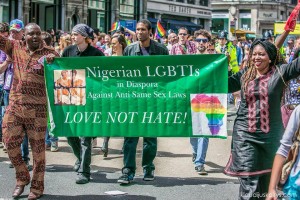 needed to tell our story from all angles.
needed to tell our story from all angles.
Many of these organisations are busy building or reviving their careers on the plight of African LGBTs without giving due consideration to what African lgbts really want. These saviours are more interested in telling a sensationalised story that would boost their donations and appeal to ‘click activism’. We appreciate the support but above all, we need our genuine, non-manipulated voices to be heard.
African LGBTs are not looking for western saviours. To make the necessary change, we must all stand as equal partners in our quest to rid the world of inequalities. We don’t need sensationalism, we need our allies to walk their talk.
Related link-
Order your sizzling copy of Freedom To Love For ALL: Homosexuality Is Not Un-African!
Trilogy: Debunking the African Homosexuality myths
Homosexuality and the legalisation of Homophobia in Africa
LGBT Rights activists demonstrates at Nigerian Centenary Awards, UK


Well said. (FYI, I excerpted portions of it here: https://76crimes.wordpress.com/2014/10/20/allies-stop-sensationalising-the-plight-of-african-lgbts/ With credit and links, of course.)
@Colin Stewart -- Thanks, and no qualms with the excerpts. 🙂